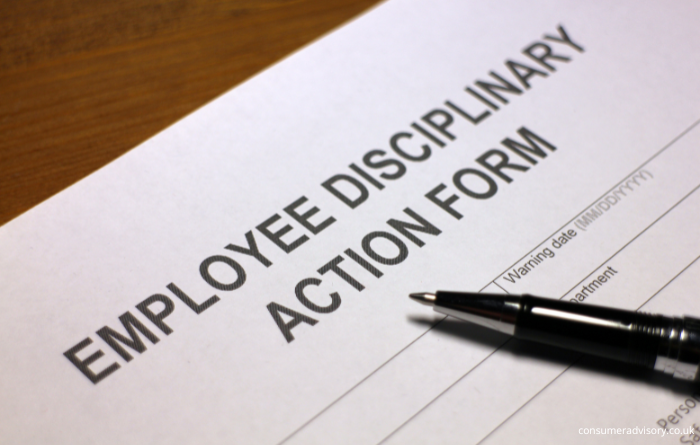
If you’ve received a disciplinary at work, you might be asking the question ‘does a disciplinary affect future jobs?’.
Yes, a disciplinary can affect future jobs. However, this doesn’t mean that you won’t be able to find a new job after misconduct at work.
Whilst you don’t have to disclose disciplinaries to future employers, they may request a reference from your previous employer before you are offered a new role. In this reference, your previous employer may disclose any misconduct to your new potential employer.
So, we’d always recommend being honest with your potential new employer during the application process. That way, you can explain how you have learned from your mistakes and ensure that there are no surprises when they receive your reference.
In this article, we’ll tell you everything you need to know about how disciplinaries affect career prospects, and how to disclose them to future employers.
How Does A Disciplinary Affect Your Career Prospects?
If you’ve been disciplined at work, it’s important to know how this will affect your career prospects. Depending on the severity of the misconduct, a disciplinary may not have any impact whatsoever on your ability to find a new job. However, if your misconduct is serious enough, it could limit your ability to find work in the future.
When you’re looking for a new job, you will usually be asked to provide references from your previous employers. Your new potential employer may also contact your previous employer to ask about your suitability for the role. In these instances, your previous employer may disclose information about any misconduct to your new employer.
If you’re worried about how a disciplinary will affect your career prospects, the best thing to do is to speak to a professional advisor. They will be able to give you tailored advice on your individual situation.
Can New Employer Find Out About Disciplinary?
When you’re applying for a new job, you may be asked to provide references from your previous employers. In these instances, your new potential employer may contact your old employer to ask about your suitability for the role.
Your old employer may disclose information about any misconduct to your new employer. However, they are not obliged to do this. So, if your performance has been good since the disciplinary and a long time has passed, there is a chance that your former employer will not disclose the disciplinary to your new employer.
Does An Employer Have To Disclose A Disciplinary In A Reference?
In the UK, there is no legal obligation for an employer to disclose disciplinary information about a former employee in a reference. So, it is the choice of the employer whether to disclose disciplinary information in their references.
However, the law states that companies have a legal duty to ensure that their references are accurate and do not mislead the new employer. So, many former employers will disclose disciplinary records as a way of providing full transparency to the new employer.
It’s worth noting that whether the disciplinary is disclosed may also depend on the nature of the misconduct. For example, if you work with vulnerable adults or children, the employer may be obliged to disclose your misconduct to protect the health and safety of others.
Ultimately, it is up to the employer to decide whether or not to disclose disciplinary information in a reference. However, it is important to note that any information that is provided must be accurate and fair.
How Do You Disclose A Disciplinary To Future Employers?
If you’re asked about a disciplinary on a job application or in an interview, it’s important to be honest. Trying to hide a disciplinary from a potential employer is likely to result in your application being rejected.
If you’re asked about a disciplinary, the best thing to do is to give a brief explanation of what happened. You should then explain what you have learned from the experience and how you have changed your behaviour as a result.
For example, if you were disciplined for being late to work, you could say something like:
“I was disciplined for being late to work on several occasions. I recognise that this was a problem and I have made a concerted effort to be punctual since then. I’m now usually one of the first to arrive at work.”
By being honest about your disciplinary and showing that you have learned from the experience, you will demonstrate to the employer that you are capable of making positive changes.

Can Being Dismissed Affect Future Employment?
Being dismissed from your job can make it difficult to find work in the future. This is because, as well as a disciplinary, dismissal will also appear on your employment history.
When you’re looking for a new job, you will usually be asked to provide references from your previous employers. Your new potential employer may also contact your previous employer to ask about your suitability for the role.
In these instances, your previous employer may disclose information about your dismissal to your new employer. This could result in your application being rejected.
Additionally, some employers will specifically exclude applicants who have been dismissed from their job in the past. So, it’s important to check the eligibility requirements of any job you’re interested in before applying.
How Long Does A Disciplinary Stay On Your Record At Work?
The length of time that a disciplinary stays on your record will depend on the company’s policy and the severity of the misconduct.
In most cases, a written warning should remain in place for 6 months. However, for more serious cases, it may remain in place for 12 months or even indefinitely.
It’s important to check with your employer to find out their policy on disciplinary records. This way, you will know how long the disciplinary will stay on your record and whether or not it could affect your future employment prospects.
Is It Better To Resign Before Being Sacked For Gross Misconduct?
If you’re facing disciplinary action for gross misconduct, you may be considering resigning before you’re sacked.
While this may seem like the best way to protect your employment history, it’s important to be aware of the potential consequences.
Firstly, if you resign, you will not be eligible for unemployment benefits. However, if you’re sacked, you may be able to claim benefits.
In contrast, you may find it more difficult to find a new job if you are dismissed for gross misconduct than if you simply resign from your job. So, for future career prospects, it can be beneficial to resign before you are dismissed.
If you’re not sure of the best way forward in your individual situation, we’d always suggest seeking advice from an experienced employment solicitor. They will be able to assess your case and advise you on the best course of action.

Can My Old Employer Say I Was Fired?
When asked for a reference for a former employee, an employer is under a legal obligation to give a fair and accurate account of their time at the company.
This means that your former employer may disclose that you were dismissed from the company if they are asked for a reference.
However, your former employer is not obliged to disclose this information unprompted. So, if you’re worried about what your former employer may say about you, you could ask them for a reference in advance.
This will give them the opportunity to flag any concerns they may have and give you a chance to address them.
Getting a positive reference from your former employer can be essential for securing future employment. So, it’s important to try and maintain a good relationship with them, even after you’ve left the company.
Is Disciplinary Action Confidential?
The disciplinary process is usually confidential. This means that your employer should not discuss the disciplinary with anyone outside of the company.
However, there are some exceptions to this rule. For example, if you’re facing criminal charges as a result of the misconduct, your employer may need to disclose this to the police.
If a potential employer requests a reference from your former employer, they may also be able to disclose information about the disciplinary.
In most cases, your employer should only discuss the disciplinary with those who need to know about it. So, if you’re worried about your employer disclosing information about the disciplinary, you could ask them to keep it confidential.
Can You Get A Job After Gross Misconduct?
It’s possible to get a job after gross misconduct, but it may be more difficult than if you had left the company voluntarily.
When applying for jobs, you will usually be asked to disclose any disciplinary action on your record. This may be disclosed by your former employer if they are asked to provide a reference for you, so it’s important to be honest about what has happened.
If you’re worried about how your disciplinary will affect your employment prospects, you could seek advice from an experienced employment solicitor. They will be able to advise you on the best way to move forward.
Do Future Employers Know If You Were Fired?
If you’re worried about how your dismissal will affect your employment prospects, you’re not alone. Many people who are dismissed for gross misconduct worry that they will never be able to get another job.
However, it’s important to remember that potential employers are only likely to find out if you were fired if you disclose it on your application or if your former employer discloses it when providing a reference.
In most cases, it’s best to be honest about what has happened. This will give you the opportunity to explain the circumstances surrounding your dismissal and show that you have learned from your mistakes.
In Summary
While a disciplinary can affect your future employment prospects, it is not necessarily a barrier to getting a new job. There are steps you can take to improve your chances of securing future employment, such as seeking advice from an experienced solicitor and maintaining a good relationship with your former employer.
In this article, we have answered the question ‘does a disciplinary affect future jobs?’, as well as answering some of the most commonly asked questions about misconduct.
